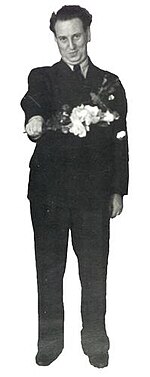Max Ehrlich
| Max Ehrlich | |
|---|---|

Max Ehrlich on stage in a prisoners' cabaret show in the Nazi concentration camp Westerbork in 1943
|
|
| Born |
Max Michaelis Ehrlich December 7, 1892 Berlin, Germany |
| Died | October 1, 1944 (aged 51) Oświęcim, Poland |
| Cause of death | Carbon monoxide poisoning |
| Nationality | German |
| Occupation | Actor, screenwriter, director |
| Years active | 1926-1944 |
Max Michaelis Ehrlich (7 December 1892, Berlin – 1 October 1944, Auschwitz concentration camp) was a German actor, screenwriter, and director on the German theater, comedy and cabaret scene of the 1930s.
Ehrlich began his career in the 1920s at various theatres, including leading roles in Max Reinhardt productions and revues. He appeared in 42 films, ten of which he directed, and on eight records. He wrote several books, including From Adelbert to Zilzer, his best-selling humorous collection of stories and anecdotes about sixty-two of his best known show business friends and colleagues.
In 1933, the National Socialists seized power and stopped Ehrlich and his other Jewish colleagues from working in Germany. As a result, he left for Vienna to appear with the Rudolf Nelson Revue. However, there too, Austrian anti-Semites interrupted the show with cries of "Jews, get out of Vienna." Consequently, the troupe left for The Netherlands, stopping en route for stage appearances in Switzerland.
In 1935, homesick for his native land, Ehrlich returned to Nazi Germany. Jewish entertainers once again were permitted to perform there but only within the framework of the Jüdischer Kulturbund (Jewish Cultural Union) and exclusively in front of Jewish audiences. Ehrlich was named director of the Kulturbund's light theatre departments. However, following the 1938 pogrom "Kristallnacht," he decided to leave Germany definitively. Both of his farewell performances immediately sold out, so that a third presentation on 2 April 1939 was added. Here, in front of a full house of fans, calling out their affection and encouragement, Ehrlich made his final appearance in Germany.
Subsequently, he returned to the Netherlands once again and joined 's "Theater der Prominenten" (Theatre of Celebrities), until in 1943 –like so many of his colleagues– Ehrlich was imprisoned in the Westerbork concentration camp. While at Westerbork, he created and became director of the "Camp Westerbork Theatre Group," a cabaret troupe that during its eighteen-month existence staged six major theatre productions, all within the concentration camp's confines. A majority of the actors were famous Jewish show business personalities; prominent artists from Berlin and Vienna, such as Willy Rosen, Erich Ziegler, Camilla Spira, and Kurt Gerron; or well known Dutch performers, like Esther Philipse, , and . At its high point, the group counted fifty-one members, including a full team of musicians, dancers, choreographers, artists, tailors, and make-up, lighting, and other technicians, as well as stage hands.
...
Wikipedia
